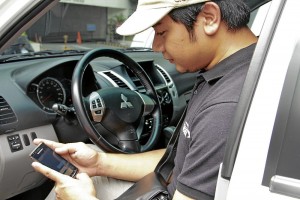
CUSTOMERS with Smart Money account can text a code to have their parking fee automatically deducted from their mobile wallet.
Among the many challenges a motorist must go through—everyday-high fuel prices, heavy traffic, horrendous potholes—parking can be the most daunting of them all. Parking is invariably at the end of your journey, often when you’re running out of time, if not outright late already. Finding a space, any space at all, seems miraculous in most parts of the city, such that we treat payment as a relief more than anything.
Yet, as with anything, there is a better way. Better than having to scramble in your ashtray for coins, or digging into your wallet for small bills—when you’ve just withdrawn 1000-peso notes from the ATM. One such better way is here. Smart Money has introduced payment via SMS on the Roxas Boulevard service road in Manila. The system is dubbed as the first cashless and automated street parking system in the Philippines.
The system involves 90 parking slots between Pedro Gil Street at the Magsaysay Center on Roxas Boulevard. Customers with Smart Money account can text a code to have their parking fee automatically deducted from their mobile wallet. The format is Park <the number of hours they intend to park> <the slot number painted on the sidewalk> <parking fee>, which should be sent to 270. The parking fee is P10 per hour, with a minimum of two hours. The SMS itself is free of charge, and an acknowledgement text will be sent back.
Smart Financial Services head Tricia Dizon says: “No more rummaging in your bag for a wallet and for spare change. Also, there will be no more panic over missing parking receipts because the system will send you an SMS containing the details of your transaction right after you text the code.”
And for further convenience, thirty minutes before one’s parking time expires, the system will send an SMS reminding the motorist to either vacate the slot or send additional parking “load,” using the same code to extend their use of the slot. “Unlike in other countries where you have to physically put money into a parking meter to extend your stay, here you can just send a text message. When you are in the middle of a meeting or a lunch date, you can stop worrying that your vehicle would overstay and get towed or tire-clamped,” Dizon said.
Smart Money has partnered with parking operator Wi-Tech Solutions & Development Corp. to run the system. Wi-Tech’s Rene Tongco says that the electronic payment system is more efficient that those typically found in other countries, as theirs does not require bulky parking meters or computerized kiosks. According to Tongco: “All parking slots are monitored and metered by a remotely located central parking management server. We have equipped our parking attendants with tablet computers so they can view the details of each parking space. They can see the exact time a vehicle occupies a slot, if the vehicle owner has already paid or not, and if the time has expired.”
The ten million-subscriber question is: What if you don’t have a Smart Money account? E-loaders in the area can reportedly remit the amount to the system, for a minimal fee of P3 to P5.
“This high-tech system runs on Smart’s powerful network. Wi-Tech chose Smart as our network and payment platform because we are confident that Smart’s system is stable, reliable, and mature,” Tongco said. And at least that network is known to have a working signal when you need it, he might as well added.
What is next for this system? While parking buildings with their built-in payment booths may still be more suitable for the traditional payment schemes, open-lot parking and street parking seem to be ideal for the Smart-powered system. As anyone who has had their vehicle clamped or had an expensive parking ticket written out to them, the Smart Money SMS-payment system comes a step closer to what the motorist needs—hassle-free parking. Now, we wonder if the watch-your-car boys will accept electronic money.